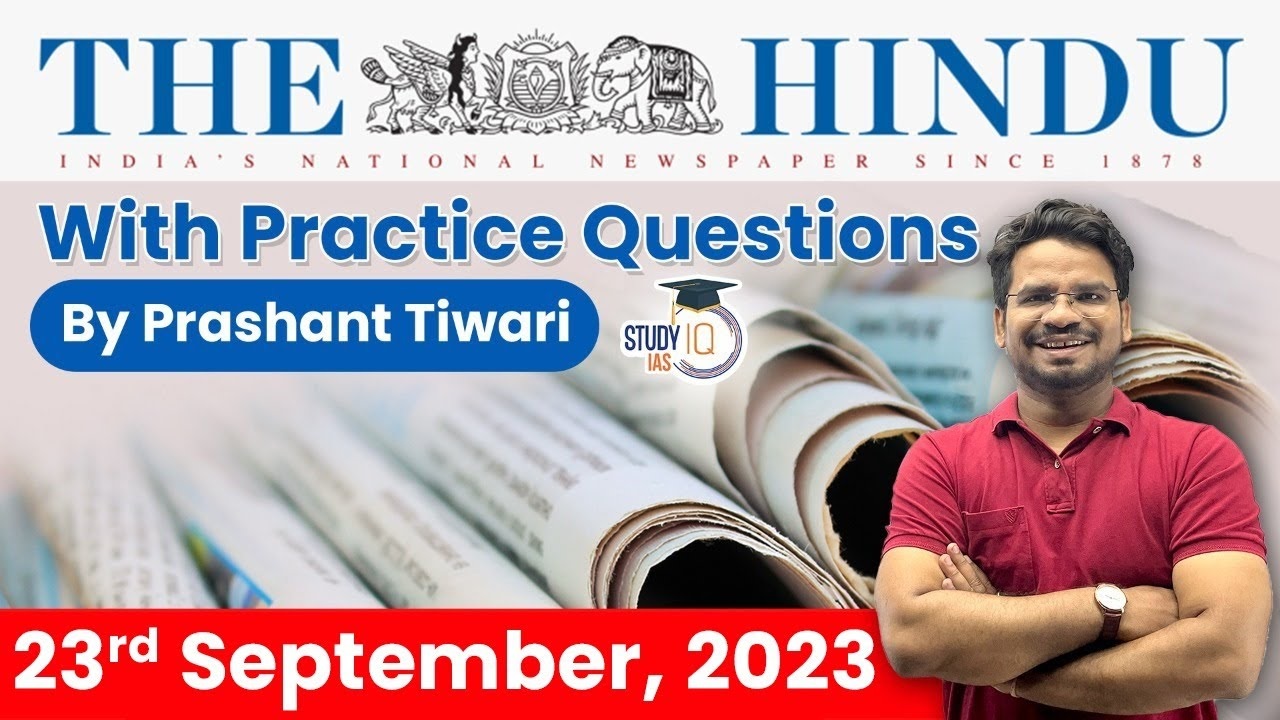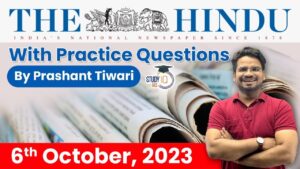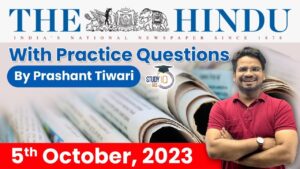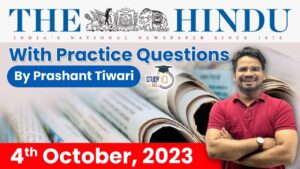The Hindu Newspaper Analysis for UPSC

The Hindu Newspaper Analysis 22 September 2023


- Union Sports Minister Anurag Thakur on Friday cancelled his visit to the Asian Games, due to China’s denial of entry to Indian wushu players from Arunachal Pradesh, even as the government registered an official protest at the decision.
- The three players — Nyeman Wangsu, Onilu Tega and Mepung Lamgu — were refused entry despite having e-accreditations from the organisers.
- While Ms. Wangsu could not board the flight from Delhi at all, the other two were told they could only travel till Hong Kong. With no further development and their event scheduled for Sunday, it seems unlikely they will be able to participate.


- At the G-20 summit in New Delhi earlier this month, United States President Joe Biden and others unveiled a U.S.-backed infrastructure project to connect India, West Asia and Europe with shipping lanes, rail networks, pipelines and data cables.
- One is the continuation of the Trump-era policy of bringing America’s two pillars in the region — the Gulf Arabs and Israel — closer to meet their common geopolitical challenges such as Iran’s rise.
- The second part of Mr. Biden’s approach is to reassure America’s friends and allies that the U.S. is not exiting West Asia. In 2012, leaders of India, Israel, the U.S. and the UAE held a virtual summit of what is now called the I2U2 minilateral.
- India’s presence in a grouping of the Abraham Accords countries was seen as a legitimate recognition of India’s presence in the region.
- The India-Middle East-Europe Corridor, announced at the G-20 summit (referred to in the first paragraph), enhances New Delhi’s standing. It seeks to build an economic corridor from India’s western coast, through the Gulf (the UAE and Saudi Arabia), Jordan and Israel, to the Mediterranean, bringing India and Europe closer.
- The U.S. may not want to exit West Asia, but it has deprioritised the region in terms of its security commitments as its focus has shifted back to Eastern Europe and East Asia.
- China has not only emerged as the biggest trading partner of America’s Gulf Arab allies and a major investor in the region but has also shown a willingness to play a bigger role as peacemaker, which was evident in the Iran-Saudi reconciliation agreement.
- For India, the U.S.-China competition in West Asia opens new avenues of engagement.
- The U.S. sees India, with its size, the size of its economy and the legacy of its historical engagement and cultural connect with the region, as an important partner in its bid to continue to shape West’s Asia’s geopolitics.
- India should welcome the moment but should not look at it through the prism of another Cold War — or it should not put all its eggs in one basket as it did in Afghanistan.



- Census collects population data that is crucial to planning and development, and the exercise is rarely devoid of political intent or consequence.
- India has conducted the Census every 10 years since 1881, but in 2020, the decennial exercise for the 2021 Census had to be postponed due to the COVID-19 pandemic.
- On September 20, Home Minister Amit Shah told the Lok Sabha that the Census will take place after the 2024 general election.
- A Census after 2026 will become the basis of the next delimitation of Lok Sabha seats, which will involve inter-State redistribution of representation.
- The first synchronous census was taken in 1881, by W.C. Plowden, Census Commissioner of India. Since then, censuses have been undertaken uninterruptedly once every ten years.
- The Census of India Act of 1948 provides the legal framework for carrying out the Census however, it does not mention its timing or periodicity.
- Hence, a Census is Constitutionally mandated in India but there is no Constitutional or legal requirement that it needs to be conducted decennially.
- The 10-year frequency is followed in many countries (Ex. the US and the UK) but some countries like Australia, Canada, Japan conduct it every five years.
- The census is a Union subject under Article 246 of India Constitution. As per the provisions of the Census Act 1948, the Census of India is conducted.
- Nodal Ministry:
- The decennial Census is conducted by the Office of the Registrar General and Census Commissioner, Ministry of Home Affairs.
- Until 1951, the Census Organisation was set up on an ad-hoc basis for each Census.

- About Adjournment Sine Die:
- Adjournment sine die means terminating a sitting of Parliament for an indefinite period i.e. without naming a day for reassembly.
- The power of adjournment sine die lies with the presiding officer of the House.
- He can also call a sitting of the House before the date or time to which it has been adjourned or at any time after the House has been adjourned sine die.

- Meeting early on Friday morning along the fringes of the 78thsession of the United Nations General Assembly (UNGA), Foreign Ministers of the Quad (India, Australia, Japan and the U.S.) reaffirmed the group’s commitment to a “free and open” Indo-Pacific region, where disputes are settled in accordance with international law.
- The Quad also committed itself to the principles of the UN charter and reform of the institution.
- A new initiative to help countries respond to terror attacks was also discussed on Friday, as per a joint readout of the meeting.
- On Ukraine, the Quad readout struck a similar note to the recent G-20 joint statement from New Delhi. It expressed “deep concern”, calling for a “just” and “lasting” peace in Ukraine,without naming Russia as the aggressor.


 The Hindu Newspaper Analysis 6 October 2...
The Hindu Newspaper Analysis 6 October 2...
 The Hindu Newspaper Analysis 5 October 2...
The Hindu Newspaper Analysis 5 October 2...
 The Hindu Newspaper Analysis 4 October 2...
The Hindu Newspaper Analysis 4 October 2...





















